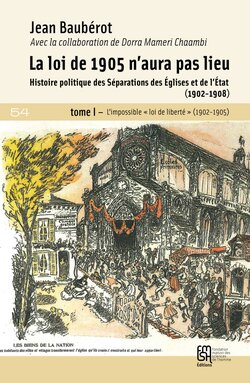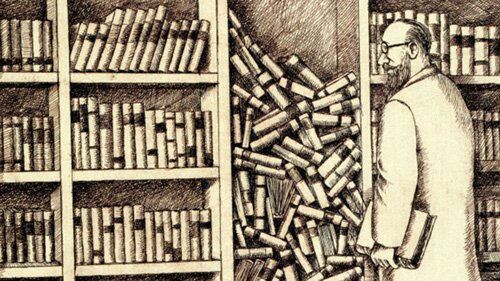The 1905 law did not happen.

Volume1 : The impossible “law of freedom”
The Law of December 9th 1905, separating Church from State, makes up the heart of secular France. Yet relatively few works have been produced on this historic event. Knowing the end of the story, Jena Baubérot tends to describe a logical process which led to passing and implementing the law, effectively pacificatory. Why did the same MPs who voted the “combiste” laws also pass the “law of liberty” (A. Briand) that made up the 1905 law? Why and how?
To resolve this “enigma”, J. Baubérot is inspired by the famous TV investigations of lieutenatn Colombo where, since the beginning, the outcome is known ignoring the multiple twists which make it possible.
In the first volume The Impossible Law of Liberty (1902-1905), J. Baubérot shows that an internal conflict within the republican left itself proved to be decisive and, what has not been taken into account until now, free-thinking itself disowned the Combes bill, thus contributing to his fall. He also shows the role played in the debates by numerous personalities of the period, including Marcel Proust. Finally, in the line of the great collective work The World History of France published in 2017 (edited by Patrick Boucheron), the author proves that a Franco-French vision of the 1905 law cannot explain it: foreign models (Mexico, USA, Canada, Switzerland, …) have inspired the authors of the law and the international situation, strongly marked by the Russian-Japanese war and the fear of its expansion, have played a role.
In the end, the 1905 law was a double victory for the French Republic: victory over the most intransigent adversaries, and also, victory over itself, its temptation, in the name of “an Ideal State”, refusing to admit “diversity in liberty” (Clemenceau). Thanks to collaboration with DorraMameri-Chaambi, a large collection of documents, mostly unpublished, has been brought together. It is summarized by the author in an account which brings new material to specialists while alos being accessible to the wider educated public. On the way, what we find, in one way or another, the essential problems already present in French society in 1905: ordinary anti-Semitism, the fight for women’s rights, uncertainties concerning the “moral culture” which allows to “make society”, the role of science in a modern State, …

Éditions de la Maison des sciences de l'homme, Paris
Support Paperback
ISBN-10 2-7351-2500-9
ISBN-13 978-2-7351-2500-5
GTIN13 (EAN13) 9782735125005
Buy the book via the Comptoir des presses universitaires
Table of contents
Prélude. Séparation/séparations : paradoxes et rebondissements
Première partie. Ces chemins, qui zigzaguent à travers les broussailles, mènent-ils à la Séparation ?
Chapitre premier. Du refus de la séparation par le Bloc à l'« incroyable déclaration » de Combes
Chapitre 2. La morale laïque a-t-elle échoué ?
Chapitre 3. L'affrontement des représentations de la liberté
Chapitre 4. Un pas vers la Séparation ?
Chapitre 5. La «Commission des Trente-trois » ou l'ouverture de l'extrême gauche au centre
Seconde Partie. La première « guerre » des séparations républicaines
Chapitre premier. Arrêt sur image. États-Unis et/ou Mexique : quel modèle pour la laïcité française ?
Chapitre 2. La Séparation de Briand à Combes, en passant… du côté de chez Proust
Chapitre 3. De la Séparation-Arlésienne à la Séparation-Pénélope
Chapitre 4. Quand le lièvre Combes gagne contre la tortue Briand
Chapitre 5. La France laïque et l'international : protectorat des missions, « péril jaune », guerre russo-japonaise, et enjeux de laïcité
Postlude. Le Bloc, les conflits entre laïques et la question démocratique
Bonus
Passages coupés
Articles et ouvrages cités
Sigles
Index des noms
Index des lieux
Index sélectif des notions
Index sélectif des expressions d’époque

De la rue à la mairie

Les refus de la maternité

Se souvenir d'Humoresques


